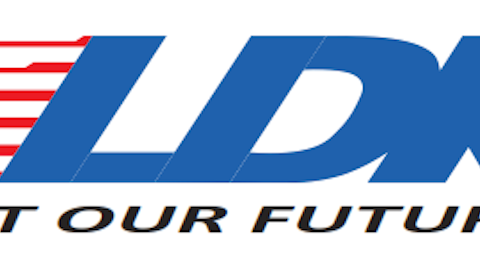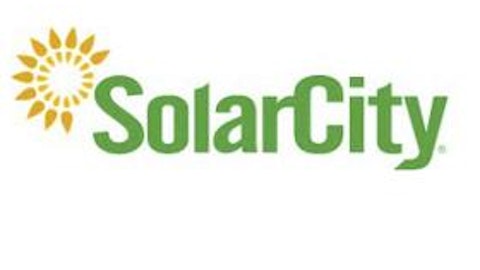
Who is right and how should investors view solar panel efficiency? This could be the most important factor in who will win in the future of solar, so let’s look at the role efficiency plays and how it affects the biggest players in the solar industry.
Solar panel efficiency affects cost
It isn’t as if efficiency and cost are factors that are mutually exclusive. The efficiency of a module directly influences the cost per kW-hr of a solar system. So, the intersection of efficiency, panel cost, and balance of system costs are what we need to consider.
Sunrun’s Fenster pointed out that the panel itself accounts for only about 20% of an installation’s cost and that decisions about staffing or racking costs are more important than a few cents per watt here or there. But he doesn’t think that the added cost of a SunPower Corporation (NASDAQ:SPWR) panel is worth it for installers. It’s also important to note that he doesn’t think low-quality Chinese panels will ever catch on, and that companies like Kyocera, LG, and Sharp, who have strong balance sheets, high quality, and low costs, will be winners instead of premium efficiency products. There is a minimum quality threshold a company has to meet, but in Fenster’s view SunPower Corporation (NASDAQ:SPWR)’s panels are over the top and not worth the cost.
I did ask both Fenster and Kreamer about using First Solar, Inc. (NASDAQ:FSLR) panels, but they’re so low efficiency and have little cost advantage over Asian-made panels that they’re not worth it. So, clearly efficiency matters, but only to an extent. The degree of that extent’s effect depends on where you sit in the industry.
Solar panels by the numbers
So, when does efficiency matter in a solar panel and when doesn’t it? Let’s look at a table I built late last year to illustrate how efficiency and costs interact. You can see the full list of assumptions used here. Below, you’ll find the cost breakdown of three systems with different efficiency levels, with the lowest efficiency also having the lowest cost. There are variable components and fixed components, and the 15% efficient module (a standard Chinese product) is slightly less than 20% of the total installation cost, while the 20% efficient module is 27% of the installation cost.
| 10% Efficient Module | 15% Efficient Module | 20% Efficient Module | |
|---|---|---|---|
| System Size | 2 kW | 3 kW | 4 kW |
| Module Cost per Watt | $0.65 | $0.75 | $1.00 |
| Total Module Cost | $1,300 | $2,250 | $4,000 |
| Variable BOS Cost | $2,500 | $3,750 | $5,000 |
| Fixed BOS Cost | $6,000 | $6,000 | $6,000 |
| Total Installation Cost | $9,800 | $12,000 | $15,000 |
| Annual kW-hrs | 3,154 | 4,730 | 6,307 |
| Cost per kW-hr (assuming 8% ROI) | 24.9 cents | 20.3 cents | 19.0 cents |
These figures should ballpark real-world costs and show that efficiency has a big impact on the final cost per unit of energy. Of course, there are many sensitive components in this analysis; if the 20% efficient module costs $1.25 per watt then it would no longer be cost effective. By the same token, if variable costs play a smaller role then efficiency plays a bigger role. These variables will behave differently depending on where a system is being installed.
In the example, you can see that efficiency matters but only to an extent. A high-efficiency module is only more cost-effective if it’s below a certain cost threshold. So, the bigger the gap between Chinese modules and SunPower Corporation (NASDAQ:SPWR)modules, the less attractive SunPower modules become. This is why SunPower hasn’t been able to compete in Europe in recent years. It has much lower BOS costs, and therefore, the cost of the panels matters more.
What’s clear is that efficiency does matter but only when the rest of the system’s costs and its performance are brought into the equation. If the panel is a small percentage of a system’s costs, efficiency matters a lot, and vice versa.
Who will win the solar panel battle?
Installers, particularly those in residential, deal with this conundrum every day, and the industry is changing rapidly. SolarCity Corp (NASDAQ:SCTY) has been known to use manufacturers like Trina Solar Limited (ADR) (NYSE:TSL) and Yingli Green Energy Hold. Co. Ltd. (ADR) (NYSE:YGE) , who are two of the biggest manufacturers in the world and compete mostly on cost. Where system costs are low, they will win business.
SunPower Corporation (NASDAQ:SPWR), or a high-efficiency module, will win where costs are higher, which is why the company is focused on the California market right now. What would change this equation is if costs came down considerably. If cost per watt for 20% efficient (or greater) panels falls to $0.80, then SunPower will become more attractive.
That’s one of the reasons I’m betting on SunPower. The industry has shown time and time again that it’s easier to cut costs than to increase efficiency. So, SunPower Corporation (NASDAQ:SPWR) may not be the most attractive panel for everyone now, but in three years when its costs are lower that may change.
Putting the solar panel battle into context
Maybe the best way to think about efficiency in solar, particularly when comparing SunPower to Chinese manufacturers, is to use a couple of analogies. The performance of a BMW may not be significantly better than a Cadillac, but it costs a lot more money because of brand and perception. The same could be said for Apple products, which focus on design and have very few performance differences than other PCs, even though they cost more.
Right now, SunPower Corporation (NASDAQ:SPWR) is selling a premium brand, designed with all-black panels, and that comes with a higher cost. The question is how many consumers will pay up for that brand and design if it doesn’t save them money in the long run? (Note that SunPower says that when all factors are considered, the energy from its panels costs less long term.)
I’ll also point out that when investors think about the analogy above, they should think about the profit made on each car or computer companies make. BMW and Apple may charge more, and it may not be worth it to some, but they definitely make more money per unit than competitors. Will that be the case in solar? Time will tell.
What we know for now is that a solar panel’s efficiency matters — sometimes.
The article Does a Solar Panel’s Efficiency Really Matter? originally appeared on Fool.com and is written by Travis Hoium.
Fool contributor Travis Hoium manages an account that owns shares of Apple and SunPower Corporation (NASDAQ:SPWR) and personally owns shares of SunPower and has the following options: long January 2015 $7 calls on SunPower, long January 2015 $5 calls on SunPower, long January 2015 $15 calls on SunPower, and long January 2015 $25 calls on SunPower Corporation (NASDAQ:SPWR). The Motley Fool recommends Apple. The Motley Fool owns shares of Apple.
Copyright © 1995 – 2013 The Motley Fool, LLC. All rights reserved. The Motley Fool has a disclosure policy.




